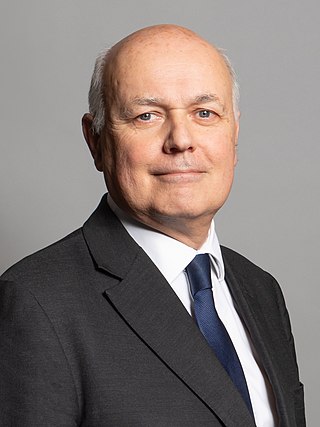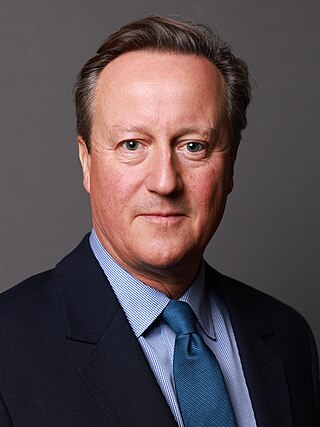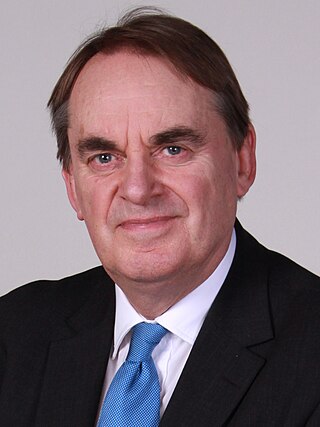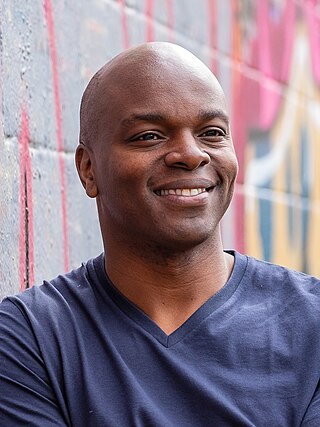The Conservative and Unionist Party, commonly the Conservative Party and colloquially known as the Tories, is one of the two main political parties in the United Kingdom, along with the Labour Party. It is the current governing party, having won the 2019 general election, and has been the primary governing party in the United Kingdom since 2010. The party sits on the right-wing to centre-right of the political spectrum. It encompasses various ideological factions including one-nation conservatives, Thatcherites, and traditionalist conservatives. The party holds the annual Conservative Party Conference, at which senior Conservative figures promote party policy.

Sir George Iain Duncan Smith, often referred to by his initials IDS, is a British politician who served as Leader of the Conservative Party and Leader of the Opposition from 2001 to 2003. He was Secretary of State for Work and Pensions from 2010 to 2016. He has been Member of Parliament (MP) for Chingford and Woodford Green, formerly Chingford, since 1992.

The welfare state of the United Kingdom began to evolve in the 1900s and early 1910s, and comprises expenditures by the government of the United Kingdom of Great Britain and Northern Ireland intended to improve health, education, employment and social security. The British system has been classified as a liberal welfare state system.

Sir Oliver Letwin is a British politician, Member of Parliament (MP) for West Dorset from 1997 to 2019. Letwin was elected as a member of the Conservative Party, but sat as an independent after having the whip removed in September 2019. He was Shadow Chancellor of the Exchequer under Michael Howard and Shadow Home Secretary under Iain Duncan Smith. He was Chancellor of the Duchy of Lancaster from 2014 to 2016.

Theresa Mary, Lady May is a British politician who served as Prime Minister of the United Kingdom and Leader of the Conservative Party from 2016 to 2019. She previously served as Home Secretary from 2010 to 2016. She has been Member of Parliament (MP) for Maidenhead since 1997. May is the second female UK prime minister, after Margaret Thatcher, and the first woman to hold two of the Great Offices of State. Ideologically, May is a one-nation conservative.

David William Donald Cameron, Baron Cameron of Chipping Norton, is a British politician who has served as Foreign Secretary since 2023. He previously served as Prime Minister of the United Kingdom from 2010 to 2016, as Leader of the Conservative Party from 2005 to 2016, and as Leader of the Opposition from 2005 to 2010, while serving as Member of Parliament (MP) for Witney from 2001 to 2016. He identifies as a one-nation conservative and has been associated with both economically liberal and socially liberal policies.

Owen William Paterson is a British former politician who served as Secretary of State for Northern Ireland from 2010 to 2012 and Secretary of State for Environment, Food and Rural Affairs from 2012 to 2014 under Prime Minister David Cameron. A member of the Conservative Party, he served as Member of Parliament (MP) for North Shropshire from 1997 until his resignation in 2021. Paterson was also the President of the Northern Ireland Conservatives.

The 2005 United Kingdom general election was held on Thursday 5 May 2005, to elect 646 members to the House of Commons. The governing Labour Party, led by Tony Blair, won its third consecutive victory, with Blair becoming the second Labour leader after Harold Wilson to form three majority governments. However, its majority fell to 66 seats; the majority it won four years earlier had been of 167 seats. This would be the last election not won by the Conservative Party as of 2024.This was the first time the Labour Party had won a third consecutive election, and as of 2024 remains the party's most recent general election victory.

The 2010 United Kingdom general election was held on Thursday 6 May 2010, with 45,597,461 registered voters entitled to vote to elect members to the House of Commons. The election took place in 650 constituencies across the United Kingdom under the first-past-the-post system.

The modern political history of the United Kingdom (1979–present) began when Margaret Thatcher gained power in 1979, giving rise to 18 years of Conservative government. Victory in the Falklands War (1982) and the government's strong opposition to trade unions helped lead the Conservative Party to another three terms in government. Thatcher initially pursued monetarist policies and went on to privatise many of Britain's nationalised companies such as British Telecom, British Gas Corporation, British Airways and British Steel Corporation. She kept the National Health Service. The controversial "poll tax" to fund local government was unpopular, and the Conservatives removed Thatcher as Prime Minister in 1990, although Michael Heseltine, the minister who did much to undermine her, did not personally benefit from her being ousted.

The 2009 European Parliament election was the United Kingdom's component of the 2009 European Parliament election, the voting for which was held on Thursday 4 June 2009. The election was held concurrently with the 2009 local elections in England. In total, 72 Members of the European Parliament were elected from the United Kingdom using proportional representation.
Annunziata Mary Rees-Mogg is a freelance journalist whose focus is finance, economics, and European politics and was a British Brexit Party then Conservative politician during 2019 and into early 2020.

Shaun Sharif Bailey, Baron Bailey of Paddington is a British politician and former journalist. A member of the Conservative Party, Bailey has been a member of the London Assembly since 2016 and the House of Lords since July 2023.

This article concerns the policies, views and voting record of David Cameron, Foreign Secretary in the Sunak ministry and former Prime Minister of the United Kingdom. Cameron describes himself as a "modern compassionate conservative" and has said that he is "fed up with the Punch and Judy politics of Westminster". He has stated that he is "certainly a big Thatcher fan, but I don't know whether that makes me a Thatcherite." Our Society, Your Life, a 2007 policy statement for the Conservative Party launched shortly after David Cameron became leader of the party, has been seen by some as a triangulation of Conservative ideology with that of Tony Blair's New Labour, linking into the idea of the Third Way and an attempted revival of one-nation conservatism. There have been claims that he described himself to journalists at a dinner during the leadership contest as the "Heir to Blair", and Cameron stated in 2005 that he did not intend to oppose the Labour government as a matter of course, and will offer his support in areas of agreement. He also wants to move the Conservatives focus away from purely fiscal matters, saying "It's time we admitted that there's more to life than money, and it's time we focused not just on GDP, but on GWB – general well-being". However, commentators have questioned the degree to which Cameron and his coalition have embodied this, instead locating them in the intellectual tradition of Thatcherism. However, Cameron has claimed to be a "liberal Conservative", and "not a deeply ideological person".

Paul Maynard is a British politician who was elected at the 2010 general election as the Member of Parliament (MP) for Blackpool North and Cleveleys. A member of the Conservative Party, he has served Parliamentary Under-Secretary of State for Pensions since November 2023. He previously as served as Parliamentary Under-Secretary of State for Justice in 2019 and for Transport from 2016 to 2018 and again from 2019 to 2020.

David Cameron's tenure as Prime Minister of the United Kingdom began on 11 May 2010 when he accepted an invitation of Queen Elizabeth II to form a government, succeeding Gordon Brown of the Labour Party, and ended on 13 July 2016 upon his resignation following the 2016 referendum that favoured Brexit, which he had opposed. As prime minister, Cameron served simultaneously as First Lord of the Treasury and as Minister for the Civil Service.

The United Kingdom government austerity programme is a fiscal policy that was adopted for a period in the early 21st century following the Great Recession. The term was used by the Coalition and Conservative governments in office from 2010 to 2019, and again during the 2021–present cost of living crisis. The two periods are separated by a stint of interventionist, Keynesian spending during the COVID-19 pandemic. The first period alone was “one of the biggest deficit reduction programmes seen in any advanced economy since World War II”, with the emphasis on shrinking the state rather than fiscal consolidation as was more common elsewhere in Europe.

The 2014 European Parliament election was the United Kingdom's component of the 2014 European Parliament election, held on Thursday 22 May 2014, coinciding with the 2014 local elections in England and Northern Ireland. In total, 73 Members of the European Parliament were elected from the United Kingdom using proportional representation. England, Scotland and Wales use a closed-list party list system of PR, while Northern Ireland used the single transferable vote (STV).
On 15 November 2012, a by-election was held for the UK House of Commons constituency of Corby. The election was held on the same day as by-elections in Cardiff South and Penarth and Manchester Central, the first direct election for the post of Mayor of Bristol, and the first Police and Crime Commissioner elections. Andy Sawford, the Labour Party candidate, won with 48% of the vote. The Conservatives' and Liberal Democrats' vote dropped significantly and UKIP came third with their highest-ever vote in a parliamentary by-election to that date.

The 2015 United Kingdom general election was held on Thursday 7 May 2015 to elect 650 Members of Parliament to the House of Commons. It was the only general election held under the rules of the Fixed-term Parliaments Act 2011 and was the last general election to be held before the United Kingdom would vote to end its membership of the European Union (EU). Local elections took place in most areas of England on the same day.














